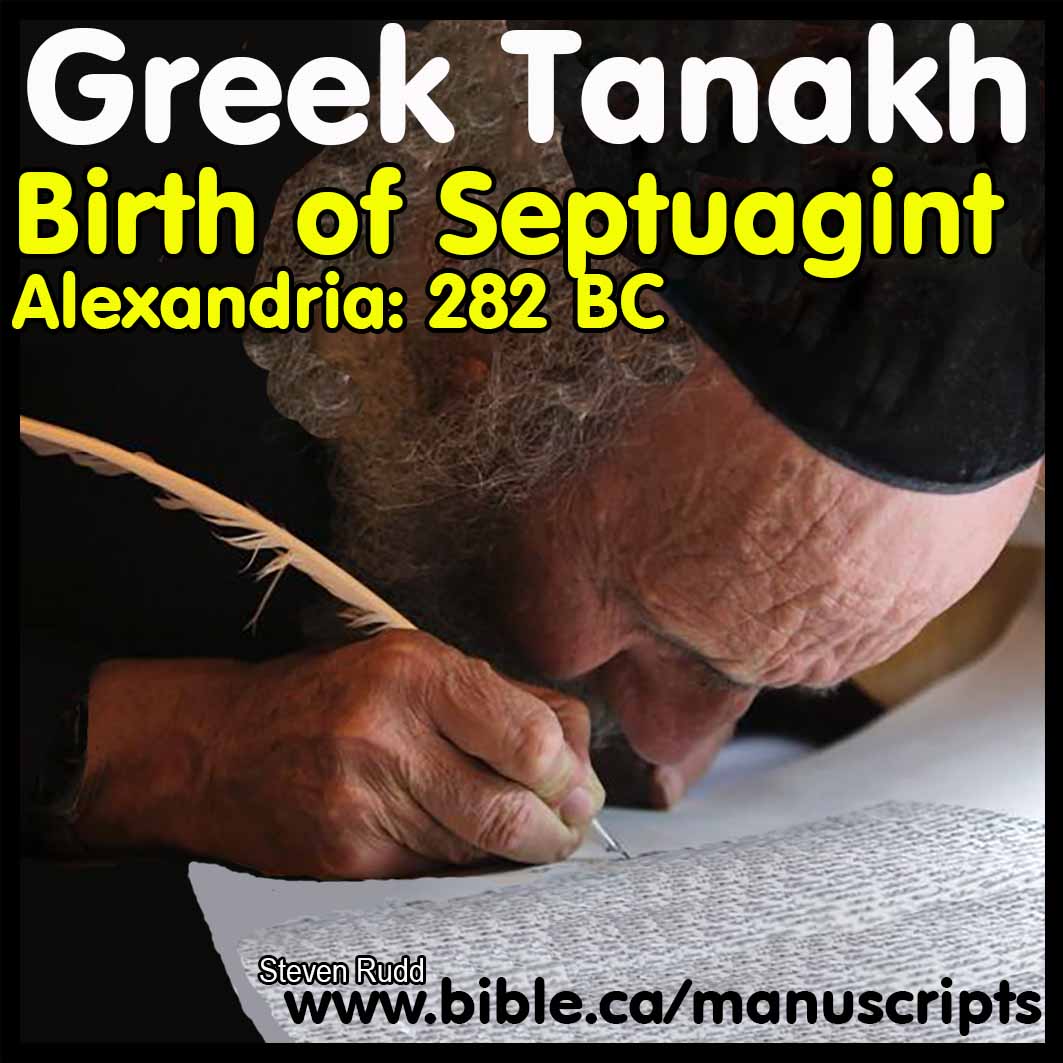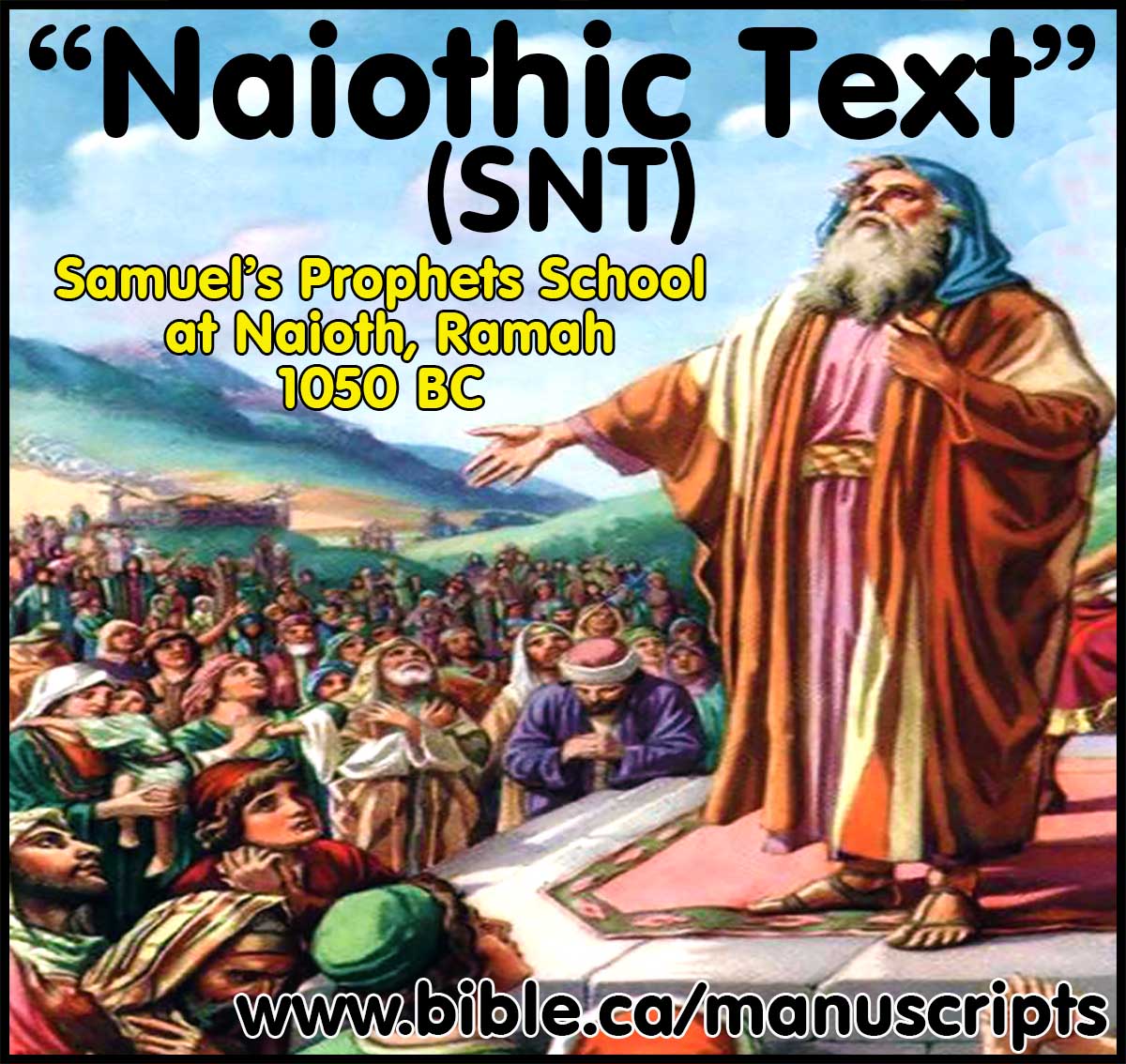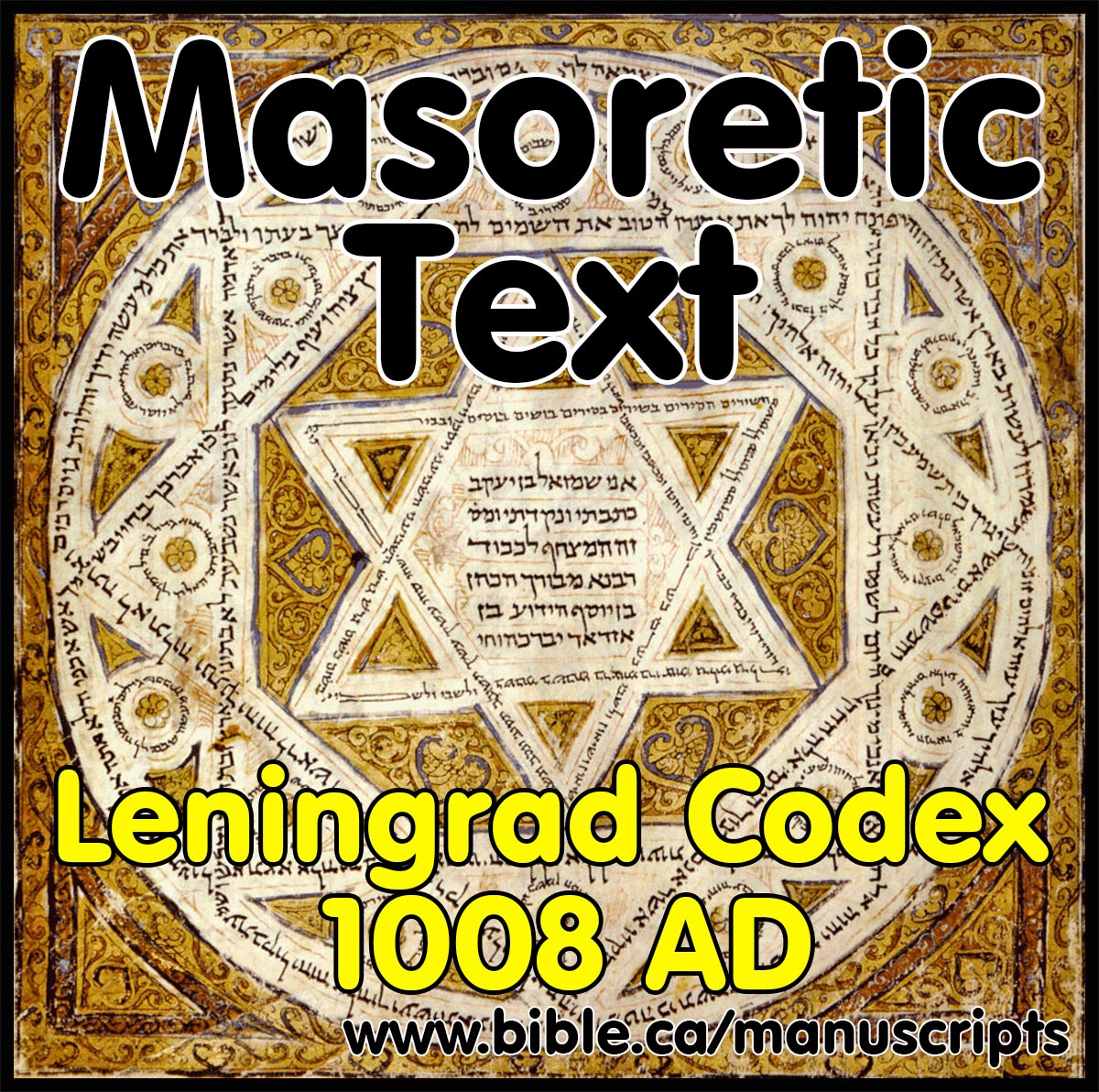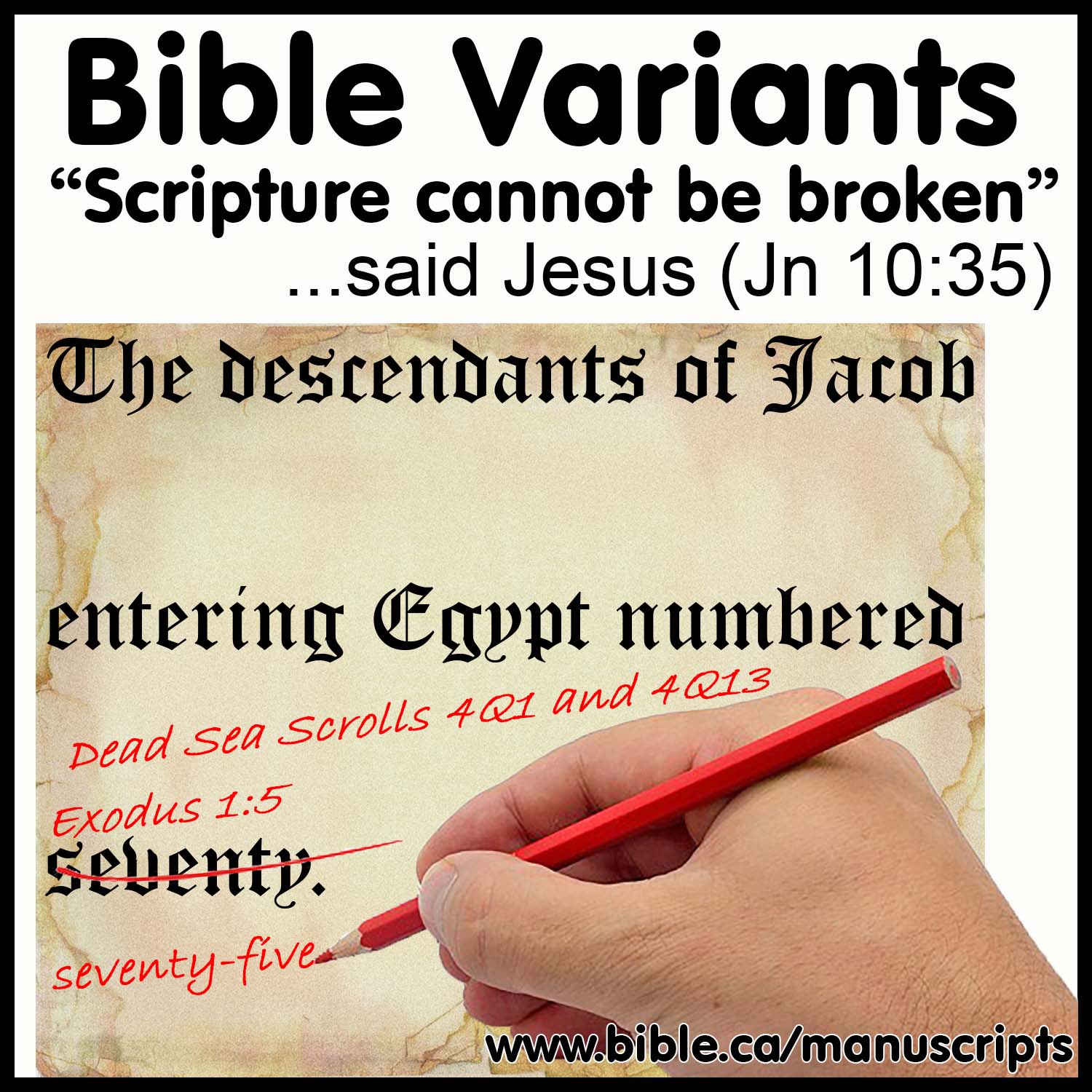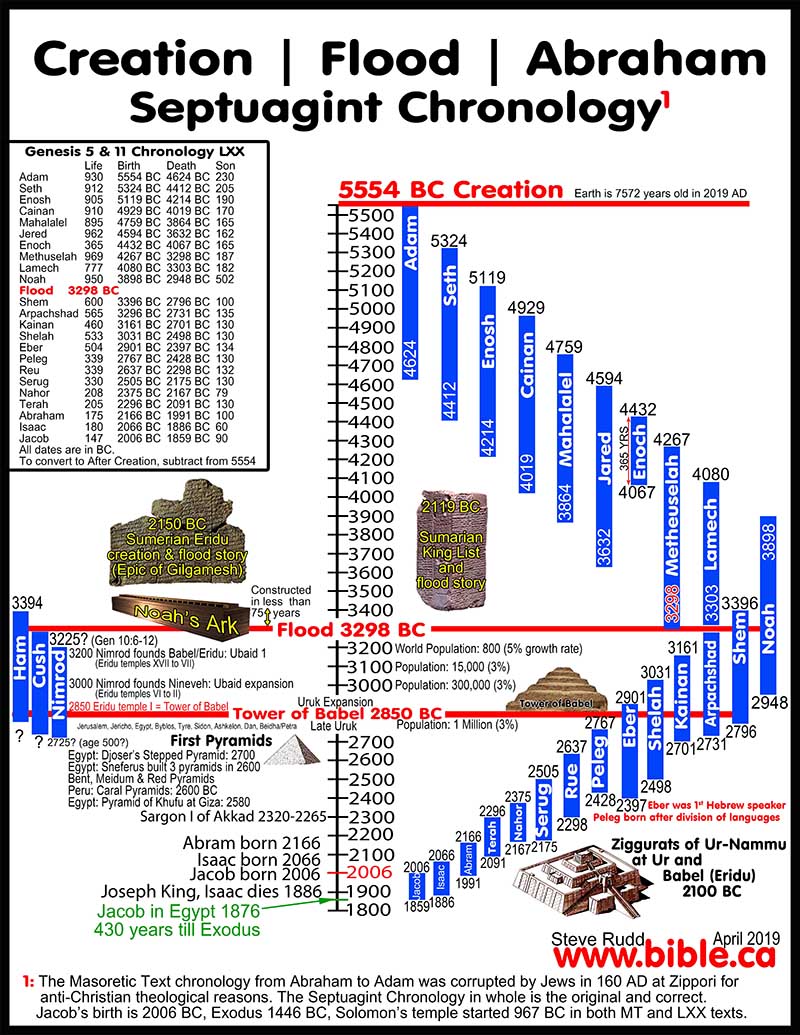282 BC: The Birth of the Greek Septuagint LXX
Historical accounts of the translation process in Alexandria under Ptolemy II
The Greek Septuagint LXX
"Scripture cannot be broken" (Jesus, John 10:35)
Steve Rudd 2017
Abstract:
The Septuagint is a Greek translation of the entire Hebrew Old Testament by pre-Christian era Jews. The city of Alexandria was founded in 331 BC by the Alexander the Great, two years after he conquered the Persian empire in 333 BC. Just ten years later, in 323 BC he died at age of 32 and the Greek kingdom split into four fulfilling the prophecy of Dan 8:8; 11:3-4. Ptolemy I (Soter) became pharaoh of the Egyptian kingdom from 323-282 BC and in 295 BC he instructed Demetrius of Phaleron [or Phalereus] to create the great library of Alexandria. During the reign of Ptolemy II (Philadelphus) 282-246 BC a sizable population of Jews lived in Alexandria (see also Josephus, Antiquities 12.7-9, below) as evidenced through archeological excavations of Jewish tombs located in the east necropolis of Ibrahimiya which dated to the time of Ptolemy II and earlier. "The number of those whom he [Ptolemy I] transported from the country of the Jews to Egypt amounted to no less than a hundred thousand." (Psudo-Aristeas 12, 150 BC) It was Ptolemy II’s librarian, Demetrius Phalereus who made the initial request to acquire a Greek copy of the Hebrew scriptures and oversaw the entire process. Under Ptolemy II the Hellenized Jews enjoyed new freedoms that included the minting of their own coins and since an increasing number of the Jews spoke Greek as their primary language, it was a win-win arrangement to put a Greek copy of the first five books of Moses (Pentateuch/Torah) into the Library of Alexandria. The Grecian Jews living in Alexandria consented with Ptolemy II to request that the Jerusalem high priest provide 72 (6 from each of 12 tribes) bilingual translators of the Torah in Egypt. The rest of the 39 Old Testament books (Joshua - Malachi) were all translated into Greek as early as 250 BC but not any later than 150 BC. The basic historical details of this story are confirmed in Pseudo-Aristea (150 BC) who says translation was achieved by mutual agreement; Aristobulus (150 BC) who says other Greek translations predated Alexander the Great; Philo (30 AD) who said the translators were inspired and speaks of an annual memorial on Pharos Island during the time of Jesus for the translation event of 282 BC. This highlights how widely accepted the Septuagint was when the church was born in 33 AD; Josephus (75 AD) who says the Jews rejoiced when they were read the Greek Bible after translation was complete; Justin Martyr (150 AD) who says the Greek Isaiah 7:14 was translated as virgin and confirms the Septuagint was widely distributed throughout the world; Irenaeus (180 AD) who says that just as God inspired Ezra to restore the scriptures lost in the destruction of the temple, so too, God inspired the translators of the LXX to create a Greek Torah. Irenaeus accuses Jews living in 130-180 AD of corrupting the long accepted Jewish translation of “virgin” in Isa 7:14; Augustine (400 AD) notes that the lower chronology found in the Hebrew Masoretic manuscript is both wrong and “impossible to explain”. Augustine lists 6 translations of Hebrew into Greek: Septuagint, Aquila, Symmachus, Theodotion, and the anonymous ‘fifth edition’. Augustine lists 2 translations into Latin: Jerome translated Hebrew into Latin, and the Vulgate translated the Greek Septuagint into Latin which was the one used by al the churches. The Greek translation of the first five books of Moses (Torah) was finished in 280 BC and "The Septuagint" was placed into the Library of Alexandria. Copies immediately began to be distributed to Greek speaking Jews in Judea and around the world which gave birth to synagogues. The Septuagint was “synagogue seed” which sprouted synagogues wherever it went.
Introduction:
- The founding of the Great Library of Alexandria in 295 BC under Ptolemy I
- "The personal tastes of Philadelphus [Ptolemy II], if by no means purely literary, included a fancy for the society of scholars and the accumulation of books. He founded a second library at the Serapeion to receive the overflow of that which Soter [Ptolemy I] had established near the Museum and the Palace. (An Introduction to the Old Testament in Greek, H. B. Swete, p16, 1914 AD)
- The great library of Alexandria
was burned by the Muslim Islamic invasion by Caliph Omar of 642 AD.
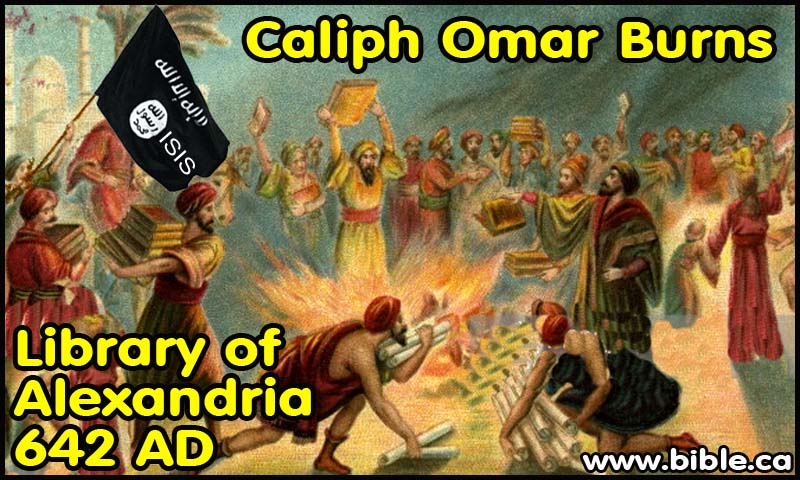
- Radical Islamic terrorists are
doing exactly the same thing today:

- Ptolemy II wants a copy of the Hebrew Bible (Tanakh) in his father’s library and commissions 72 scholars from Jerusalem to translate the first five books (Torah) into Greek:
- Although the Torah was the original commissioned work, the entire Tanakh continued to be translated and the work may have been completed as early as 250 BC. We know for certain that all 39 books of the Old Testament (Tanakh) were fully translated and copy lay on each “Table of the Scrolls” in each synagogue the world over.
- Biblical coin expert David Hendin comments: “Ptolemy II sent envoys bearing gifts to the high priest in Jerusalem. The envoys were to ask not only for copies of the five books of Moses, but also for a group of scholars to translate them into Greek. The high priest met the request and sent 72 scholars to Alexandria. It is said that each of them worked alone to complete the difficult and unprecedented task. When they were finished and the translations were compared, each of the 72 is said to have been identical. Thus, this Greek translation of the Bible was called the Septuagint or "the seventy." Now, the wisdom of the Jewish nation was available for the first time to others, including those Jews who had been born and raised outside their homeland, as in Alexandria, and had already lost fluency in the Hebrew language.” (Guide to Biblical Coins, David Hendin, 5th edition, p139, 2010 AD)
- Definition and Christian origin of the word: “Septuagint”:
- Septuagint means “the seventy” but it represents the 72 Jerusalem scholars who translated the Hebrew Torah into Greek in 202 BC.
- The term “Septuagint” was coined by Augustine around 400 AD: “When Eleazar had sent him copies in Hebrew, the king then requested that he send him translators. Six men from each of the twelve tribes, seventy-two in all, men deeply versed in both Hebrew and Greek, were appointed. Thus, the translation they made is by prevailing custom called the Septuagint.” (Augustine, Aug., City of God 18.42, 400 AD)
- Although Jews universally accepted the Septuagint in every synagogue in the world inside and outside Judea, they never referred to it as “the Septuagint”.
I. Chronological historical accounts of the translation of the Torah in 282 BC:
150 BC: Aristobulus quoted by Eusebius on the origin of the Septuagint:
- The original text of Aristobulus in 150 BC, quoted by Eusebius in 325 AD:
- “It is evident that Plato closely followed our legislation, and has carefully studied the several precepts contained in it. For others before Demetrius Phalereus, and prior to the supremacy of Alexander and the Persians, have translated both the narrative of the exodus of the Hebrews our fellow countrymen from Egypt, and the fame of all that had happened to them, and the conquest of the land, and the exposition of the whole Law; so that it is manifest that many things have been borrowed by the aforesaid philosopher, for he is very learned: as also Pythagoras transferred many of our precepts and inserted them in his own system of doctrines. ‘But the entire translation of all the contents of our law was made in the time of the king surnamed Philadelphus, thy ancestor, who brought greater zeal to the work, which was managed by Demetrius Phalereus.’ (Eusebius 325 AD, Praeparatio Evangelica, 13:12, quoting Aristobulus 150 BC)
- Summary of LXX translation details from Aristobulus in 150 BC:
- Aristobulus tells us that there were prior [Aramaic] translations of the Hebrew Bible for the Jews in Egypt prior to the rise of Alexander the Great. This must have been an Aramaic translation.
- “that the translation of the OT from Hebrew into Greek was made by seventy, or more exactly seventy-two, elders or scholars, whom king Ptolemy Philadelphus, by the advice of his librarian Demetrius Phalereus, sent for for this purpose, from the high priest Eleazar of Jerusalem.” (A Dictionary of the Bible, vol 4, p 438, 1912 AD)
150 BC: Letter of Pseudo-Aristeas on the origin of the Septuagint:
- The original text of the letter of Aristeas in 150 BC:
- "If it please you, O king, a letter shall be written to the High Priest in Jerusalem, asking him to send six elders out of every tribe—men who have lived the noblest life and are most skilled in their law—that we may find out the points in which the majority of them are in agreement, and so having obtained an accurate translation may place it in a conspicuous place in a manner worthy of the work itself and your purpose. … So they set to work comparing their several results and making them agree, and whatever they agreed upon was suitably copied out under the direction of Demetrius." (Letter of Aristeas, 32, 302, Pseudepigrapha of Greek Court-official 278-270 BC. Actual: Written by Jew in 150 BC)
- "When the work was completed, Demetrius collected together the Jewish population in the place where the translation had been made, and read it over to all, in the presence of the translators, who met with a great reception also from the people, because of the great benefits which they had conferred upon them. They bestowed warm praise upon Demetrius, too, and urged him to have the whole law transcribed and present a copy to their leaders. After the books had been read, the priests and the elders of the translators and the Jewish community and the leaders of the people stood up and said, that since so excellent and sacred and accurate a translation had been made, it was only right that it should remain as it was and no alteration should be made in it. And when the whole company expressed their approval, they bade them pronounce a curse in accordance with their custom upon any one who should make any alteration either by adding anything or changing in any way whatever any of the words which had been written or making any omission. This was a very wise precaution to ensure that the book might be preserved for all the future time unchanged." (Letter of Aristeas, 32, 308-311, Pseudepigrapha of Greek Court-official 278-270 BC. Actual: Written by Jew in 150 BC)
- Summary of LXX translation details from the letter of Aristeas in 150 BC:
- 72 translators, 6 from each tribe were brought from Jerusalem with the approval of the high priest.
- translation was achieved by mutual agreement between translators much like the KJV and the NASB.
30 AD: Philo on the origin of the Septuagint: "inspired translation"
1. The original text of Philo in 30 AD:
a. "And when they arrived at the king’s court they were hospitably received by the king; and while they feasted, they in return feasted their entertainer with witty and virtuous conversation; for he made experiment of the wisdom of each individual among them, putting to them a succession of new and extraordinary questions; and they, since the time did not allow of their being prolix in their answers, replied with great propriety and fidelity as if they were delivering apophthegms which they had already prepared. (34) So when they had won his approval, they immediately began to fulfil the objects for which that honourable embassy had been sent; and considering among themselves how important the affair was, to translate laws which had been divinely given by direct inspiration, since they were not able either to take away anything, or to add anything, or to alter anything, but were bound to preserve the original form and character of the whole composition, they looked out for the most completely purified place of all the spots on the outside of the city. For the places within the walls, as being filled with all kinds of animals, were held in suspicion by them by reason of the diseases and deaths of some, and the accursed actions of those who were in health. (35) The island of Pharos lies in front of Alexandria, the neck of which runs out like a sort of tongue towards the city, being surrounded with water of no great depth, but chiefly with shoals and shallow water, so that the great noise and roaring from the beating of the waves is kept at a considerable distance, and so mitigated. (36) They judged this place to be the most suitable of all the spots in the neighbourhood for them to enjoy quiet and tranquillity in, so that they might associate with the laws alone in their minds; and there they remained, and having taken the sacred scriptures, they lifted up them and their hands also to heaven, entreating of God that they might not fail in their object. And he assented to their prayers, that the greater part, or indeed the universal race of mankind might be benefited, by using these philosophical and entirely beautiful commandments for the correction of their lives. VII. (37) Therefore, being settled in a secret place, and nothing even being present with them except the elements of nature, the earth, the water, the air, and the heaven, concerning the creation of which they were going in the first place to explain the sacred account; for the account of the creation of the world is the beginning of the law; they, like men inspired, prophesied, not one saying one thing and another another, but every one of them employed the self-same nouns and verbs, as if some unseen prompter had suggested all their language to them. (38) And yet who is there who does not know that every language, and the Greek language above all others, is rich in a variety of words, and that it is possible to vary a sentence and to paraphrase the same idea, so as to set it forth in a great variety of manners, adapting many different forms of expression to it at different times. But this, they say, did not happen at all in the case of this translation of the law, but that, in every case, exactly corresponding Greek words were employed to translate literally the appropriate Chaldaic words, being adapted with exceeding propriety to the matters which were to be explained; (39) for just as I suppose the things which are proved in geometry and logic do not admit any variety of explanation, but the proposition which was set forth from the beginning remains unaltered, in like manner I conceive did these men find words precisely and literally corresponding to the things, which words were alone, or in the greatest possible degree, destined to explain with clearness and force the matters which it was desired to reveal. (40) And there is a very evident proof of this; for if Chaldaeans were to learn the Greek language, and if Greeks were to learn Chaldaean, and if each were to meet with those scriptures in both languages, namely, the Chaldaic and the translated version, they would admire and reverence them both as sisters, or rather as one and the same both in their facts and in their language; considering these translators not mere interpreters but hierophants and prophets to whom it had been granted it their honest and guileless minds to go along with the most pure spirit of Moses. (41) On which account, even to this very day, there is every year a solemn assembly held and a festival celebrated in the island of Pharos, to which not only the Jews but a great number of persons of other nations sail across, reverencing the place in which the first light of interpretation shone forth, and thanking God for that ancient piece of beneficence which was always young and fresh. (42) And after the prayers and the giving of thanks some of them pitched their tents on the shore, and some of them lay down without any tents in the open air on the sand of the shore, and feasted with their relations and friends, thinking the shore at that time a more beautiful abode than the furniture of the king’s palace. (43) In this way those admirable, and incomparable, and most desirable laws were made known to all people, whether private individuals or kings, and this too at a period when the nation had not been prosperous for a long time. And it is generally the case that a cloud is thrown over the affairs of those who are not flourishing, so that but little is known of them; (44) and then, if they make any fresh start and begin to improve, how great is the increase of their renown and glory? I think that in that case every nation, abandoning all their own individual customs, and utterly disregarding their national laws, would change and come over to the honour of such a people only; for their laws shining in connection with, and simultaneously with, the prosperity of the nation, will obscure all others, just as the rising sun obscures the stars." (Philo Moses II 32, 33-44, 15 AD)
2. Summary of LXX translation details from Philo
a. Philo like Christians today firmly believed in the inspiration of scripture.
b.
Philo says that the translation process happened on the Island of Pharos
where the great light house of Alexandria stood because it was free of disease,
isolated from distraction and quiet.
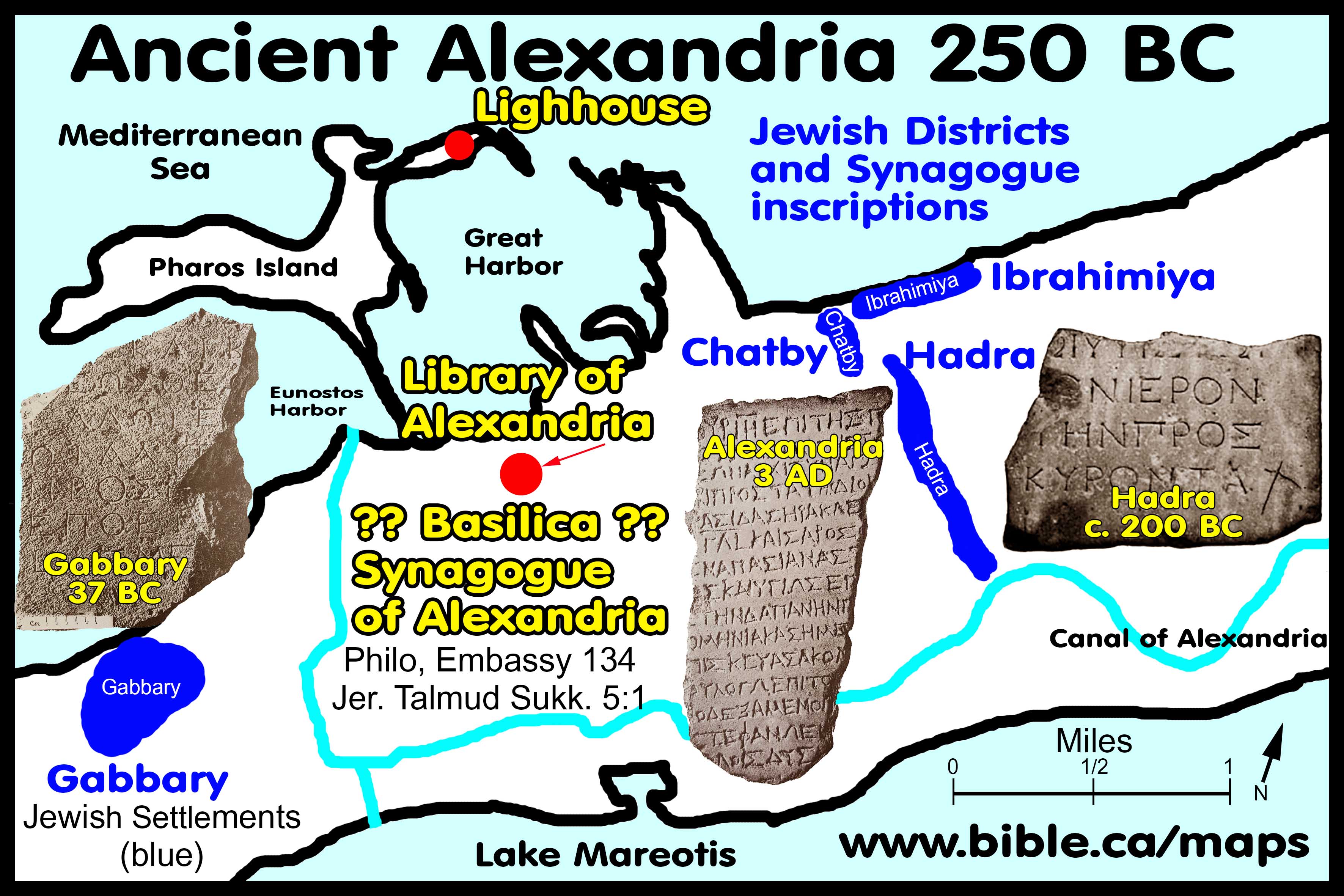
c. Just like the "KJV onlys" who believe the KJV is an inspired translation process, so too Philo says the Septuagint was inspired by God to translate Hebrew into Greek.
d. Philo speaks of an annual memorial on Pharos Island during the time of Jesus for the translation event of 282 BC. This highlights how widely accepted the Septuagint was when the church was born in 33 AD
70 AD: Josephus on the origin of the Septuagint:
1. The original text of Josephus in 70 AD
- Large population of Jews in Egypt: "But when Ptolemy had taken a great many captives, both from the mountainous parts of Judea and from the places about Jerusalem and Samaria, and the places near Mount Gerizim, he led them all into Egypt, and settled them there. (8) And as he knew that the people of Jerusalem were most faithful in the observation of oaths and covenants; and this formed the answer they made to Alexander, when he sent an embassage to them, after he had beaten Darius in battle; so he distributed many of them into garrisons, and at Alexandria gave them equal privileges of citizens with the Macedonians themselves; and required of them to take their oaths that they would keep their fidelity to the posterity of those who committed these places to their care. (9) Nay, there were not a few other Jews who, of their own accord, went into Egypt, as invited by the goodness of the soil, and by the liberality of Ptolemy." (Josephus, Antiquities 12.7-9)
- "Now when the law was transcribed, and the labor of interpretation was over, which came to its conclusion in seventy-two days, Demetrius gathered all the Jews together to the place where the laws were translated, and where the interpreters were, and read them over. (108) The multitude did also approve of those elders that were the interpreters of the law. They withal commended Demetrius for his proposal, as the inventor of what was greatly for their happiness; and they desired that he would give leave to their rulers also to read the law. Moreover they all, both the priests and the ancientest of the elders, and the principal men of their commonwealth, made it their request, that since the interpretation was happily finished, it might continue in the state it now was, and might not be altered. (109) And when they all commended that determination of theirs, they enjoined, that if anyone observed either anything superfluous, or anything omitted, that he would take a view of it again, and have it laid before them, and corrected; which was a wise action of theirs, that when the thing was judged to have been well done, it might continue forever. 14. (110) So the king rejoiced when he saw that his design of this nature was brought to perfection, to so great advantage: and he was chiefly delighted with hearing the laws read to him; and was astonished at the deep meaning and wisdom of the legislator. And he began to discourse with Demetrius, “How it came to pass that, when this legislation was so wonderful, no one, either of the poets or of the historians had made mention of it.” (111) Demetrius made answer, “that no one durst be so bold as to touch upon the description of these laws, because they were divine and venerable, and because some that had attempted it were afflicted by God.”—(112) He also told him, that “Theopompus was desirous of writing somewhat about them, but was thereupon disturbed in his mind for above thirty days’ time; and upon some intermission of his distemper, he appeased God [by prayer], as suspecting that his madness proceeded from that cause.” Nay, indeed he further saw in a dream, that his distemper befell him while he indulged too great a curiosity about divine matters, and was desirous of publishing them among common men; but when he left off that attempt he recovered his understanding again. (113) Moreover, he informed him of Theodectes, the tragic poet, concerning whom it was reported, that when in a certain dramatic representation, he was desirous to make mention of things that were contained in the sacred books, he was afflicted with a darkness in his eyes; and that upon his being conscious of the occasion of his distemper, and appeasing God (by prayer), he was freed from that affliction. 15. (114) And when the king had received these books from Demetrius, as we have said already, he adored them; and gave order, that great care should be taken of them, that they might remain uncorrupted. He also desired that the interpreters would come often to him out of Judea, (115) and that both on account of the respects that he would pay them, and on account of the presents he would make them; for he said, it was now but just to send them away, although if, of their own accord, they would come to him hereafter, they should obtain all that their own wisdom might justly require, and what his generosity was able to give them. (116)" (Josephus, Antiquities 12.107–116)
- "I found, therefore, that the second of the Ptolemies was a king who was extraordinarily diligent in what concerned learning and the collection of books; that he was also peculiarly ambitious to procure a translation of our law, and of the constitution of our government therein contained, into the Greek tongue. (11) Now Eleazar, the high priest, one not inferior to any other of that dignity among us, did not envy the forenamed king the participation of that advantage, which otherwise he would for certain have denied him, but that he knew the custom of our nation was, to hinder nothing of what we esteemed ourselves from being communicated to others. (12) Accordingly, I thought it became me both to imitate the generosity of our high priest, and to suppose there might even now be many lovers of learning like the king; for he did not obtain all our writings at that time; but those who were sent to Alexandria as interpreters, gave him only the books of the law, (13) while there were a vast number of other matters in our sacred books. They indeed contain in them the history of five thousand years; in which time happened many strange accidents, many chances of war, and great actions of the commanders, and mutations of the form of our government." (Josephus, Antiquities 1.9-13)
2. Summary of LXX translation details from Josephus:
1. Josephus says the 72 scholars took 72 days to complete the translation skill, not by inspiration.
2. Josephus records that the final version was universally accepted by the Jews and they rejoiced at its public reading.
3. Josephus describes how several men were stricken by God for trying to write “knock off-novels” of the Torah where they would change and adapt the laws for the Greeks.
150 AD: Justin Martyr on the origin of the Septuagint:
1. The original text of Justin Martyr in 150 AD
a. "When Ptolemy, King of Egypt, was forming a library, and attempting to collect the writings of every nation, he heard about these prophetic writings and he sent to Herod, then King of the Jews, [Justin surely knew that Herod was not alive in 282 BC. Grabe, Maran, and others lay the blame on the scribe, who should have written basileúonti hiereî instead of basileúonti heróde.] asking that he send the prophetic books to him. King Herod did send them, written, as we said, in the Hebrew language. But when the Egyptians could not understand these writings, he again sent and asked for some persons to translate them into the Greek tongue. After this was accomplished, the books remained in the possession of the Egyptians from that day to this, as they are also in the possession of every Jew, wherever he be. But these Jews, though they read the books, fail to grasp their meaning, and they consider us as their enemies and adversaries, killing and punishing us, just as you do, whenever they are able to do so, as you can readily imagine. In the recent Jewish war, Bar Kocheba, the leader of the Jewish uprising, ordered that only the Christians should be subjected to dreadful torments, unless they renounced and blasphemed Jesus Christ. In the books of the Prophets, indeed, we found Jesus our Christ foretold as coming to us born of a virgin, reaching manhood, curing every disease and ailment, raising the dead to life, being hated, unrecognized, and crucified, dying, rising from the dead, ascending into Heaven, and being called and actually being the Son of God. And [we found predicted also] that He would send certain persons to every nation to make known these things, and that the former Gentiles rather [than Jews] would believe in Him. He was foretold, in truth, before He actually appeared, first five thousand years before, then three thousand, then two thousand, then one thousand, and, finally, eight hundred. For, in succeeding generations new Prophets rose time and again." (Justin Martyr, 1 Apol. 31, 150 AD)
2. Summary of LXX translation details from Justin Martyr:
a. Justin describes how Ptolemy requested translators from Jerusalem for the Hebrew Bible.
b. Justin confirms the Septuagint was widely distributed in throughout the world.
c. Justin Martyr states as an unquestioned fact even among the Jews, that the Greek Isaiah used the word “virgin” in Isa 7:14.
175 AD: Clement of Alexandria on the origin of the Septuagint:
1. The original text of Clement of Alexandria in 175 AD
a. “So much for chronology, the many different records of others, and my own exposition. It is said that the translation of the Scriptures, meaning the Law and the prophets, from Hebrew into Greek took place in the reign of Ptolemy Lagus or, according to others, Ptolemy called Philadelphus. The king showed the greatest enthusiasm for the undertaking, and Demetrius of Phalerum paid close attention to the whole business of the translation. (2) The Macedonians were still in control of Asia when the king, in his ambition to adorn the Library he had founded in Alexandria with everything written, thought that the people of Jerusalem should translate their prophecies into Greek. 149(1) They, being Macedonian subjects, chose from among their most reputed people seventy experts in the Scriptures who were familiar with the Greek language, and sent them to him with their sacred books. (2) Each translated every individual prophecy separately. When they were compared, all the translations agreed in both sense and diction! It was God’s will to achieve a result for Greek ears. (3) Nothing strange that the inspiration of the God who granted the original prophecy should direct the translation to make it a kind of Greek prophecy. In the captivity under Nabuchodonosor, the Scriptures were destroyed. In the time of Artaxerxes, king of Persia, the Levite and priest Esdras (Ezra) was inspired to a prophetic restoration of all the old documents. 150(1) Aristobulus, in volume one of his To Philometor, wrote: “Plato too was a follower of our system of law, and it is obvious that he had spent a lot of time on each of its precepts. (2) There had been a translation by others before Demetrius, before the domination of Alexander or the Persians, recording the events concerning the exodus from Egypt of our fellow citizens the Jews, the realization of all that happened to them, the conquest of their own land, and the exposition of the whole system of law. (3) It is clear enough that the philosopher I mentioned, a man of wide learning, took a great deal from it, much as Pythagoras borrowed a great deal from us to form his own philosophic system.” (4) The Pythagorean philosopher Numenius wrote directly: “What is Plato but Moses speaking Greek?”694 This Moses was a theologian and prophet and, in the eyes of some, an interpreter of sacred laws. (5) The actual Scriptures—and they merit our full confidence—record his birth, actions, and life. However, we too must speak of him as briefly as may be.” (Clement of Alexander, Misc. 1.22.148–150, 175 AD)
2. Summary of LXX translation details from Clement of Alexandria:
a. It is important to remember that Clement is living in the same city that the Septuagint was translated in: Alexandria.
b. Clement says that all the Bible scrolls were destroyed by fire by Nebuchadnezzar in 587 BC.
c. Clement believed that Ezra restored the lost bible scrolls by inspiration and uses that “fact” as a basis for his claim that the LXX translators were inspired.
d. Clement mentions that there were many translations of the Bible during the Persian period before Alexander the Great in 333 AD.
e. Clement viewed the LXX translation process as inspired.
180 AD: Irenaeus on the origin of the Septuagint:
1. The original text of Irenaeus in 180 AD
a. “God, then, was made man, and the Lord did Himself save us, giving us the token of the Virgin. But not as some allege, among those now presuming to expound the Scripture, [thus:] “Behold, a young woman shall conceive, and bring forth a son,” as Theodotion the Ephesian has interpreted, and Aquila of Pontus, both Jewish proselytes. The Ebionites, following these, assert that He was begotten by Joseph; thus destroying, as far as in them lies, such a marvellous dispensation of God, and setting aside the testimony of the prophets which proceeded from God. For truly this prediction was uttered before the removal of the people to Babylon; that is, anterior to the supremacy acquired by the Medes and Persians. But it was interpreted into Greek by the Jews themselves, much before the period of our Lord’s advent, that there might remain no suspicion that perchance the Jews, complying with our humour, did put this interpretation upon these words. They indeed, had they been cognizant of our future existence, and that we should use these proofs from the Scriptures, would themselves never have hesitated to burn their own Scriptures, which do declare that all other nations partake of [eternal] life, and show that they who boast themselves as being the house of Jacob and the people of Israel, are disinherited from the grace of God. 2. For before the Romans possessed their kingdom, while as yet the Macedonians held Asia, Ptolemy the son of Lagus, being anxious to adorn the library which he had founded in Alexandria, with a collection of the writings of all men, which were [works] of merit, made request to the people of Jerusalem, that they should have their Scriptures translated into the Greek language. And they—for at that time they were still subject to the Macedonians—sent to Ptolemy seventy of their elders, who were thoroughly skilled in the Scriptures and in both the languages, to carry out what he had desired.13 But he, wishing to test them individually, and fearing lest they might perchance, by taking counsel together, conceal the truth in the Scriptures, by their interpretation, separated them from each other, and commanded them all to write the same translation. He did this with respect to all the books. But when they came together in the same place before Ptolemy, and each of them compared his own interpretation with that of every other, God was indeed glorified, and the Scriptures were acknowledged as truly divine. For all of them read out the common translation [which they had prepared] in the very same words and the very same names, from beginning to end, so that even the Gentiles present perceived that the Scriptures had been interpreted by the inspiration of God. And there was nothing astonishing in God having done this,—He who, when, during the captivity of the people under Nebuchadnezzar, the Scriptures had been corrupted [destroyed], and when, after seventy years, the Jews had returned to their own land, then, in the times of Artaxerxes king of the Persians, inspired Ezra the priest, of the tribe of Levi, to recast all the words of the former prophets, and to re-establish with the people the Mosaic legislation. 3. Since, therefore, the Scriptures have been interpreted with such fidelity, and by the grace of God, and since from these God has prepared and formed again our faith towards His Son, and has preserved to us the unadulterated Scriptures in Egypt, where the house of Jacob flourished, fleeing from the famine in Canaan; where also our Lord was preserved when He fled from the persecution set on foot by Herod; and [since] this interpretation of these Scriptures was made prior to our Lord’s descent [to earth], and came into being before the Christians appeared—for our Lord was born about the forty-first year of the reign of Augustus; but Ptolemy was much earlier, under whom the Scriptures were interpreted;—[since these things are so, I say,] truly these men are proved to be impudent and presumptuous, who would now show a desire to make different translations, when we refute them out of these Scriptures, and shut them up to a belief in the advent of the Son of God. But our faith is stedfast, unfeigned, and the only true one, having clear proof from these Scriptures, which were interpreted in the way I have related; and the preaching of the Church is without interpolation. For the apostles, since they are of more ancient date than all these [heretics], agree with this aforesaid translation; and the translation harmonizes with the tradition of the apostles. For Peter, and John, and Matthew, and Paul, and the rest successively, as well as their followers, did set forth all prophetical [announcements], just as the interpretation of the elders contains them.” (Irenaeus, Against Heresies 3.21.1–3, 180 AD)
2. Summary of LXX translation details from Irenaeus
a. Irenaeus describes how Ptolemy II had all 70 Jewish translators be partitioned from each other to translate a single passage then return to him their work. Ptolemy II was astonished that the translations were all identical. This was an initial one time test and the actual translating was achieved by all working together on a single text.
b. Irenaeus says that just as God inspired Ezra to restore the scriptures lost in the destruction of the temple, so too, God inspired the translators of the LXX to create a Greek Torah.
c. Both Philo and Irenaeus say the LXX translators were inspired.
d. Irenaeus names two Jewish proselytes who lived 129-181 AD who actually changed and corrupted the accepted text of the Greek Isaiah 7:14: “Epiphanius, in his De Mensuris, gives an account of these two men. The former published his version of the Old Testament in the year 181. The latter put forth his translation half a century earlier, about 129 a.d. This reference to the version of Theodotion furnishes a note of date as to the time when Irenæus published his work: it must have been subsequently to a.d. 181.” (ANF1, Page 451, footnote 11)
e. Irenaeus said the word Virgin was chosen by Jews long before Christ was born: “But it [Virgin in Isa 7:14] was interpreted into Greek by the Jews themselves, much before the period of our Lord’s advent, that there might remain no suspicion that perchance the Jews, complying with our humour, did put this interpretation upon these words.”
f. Irenaeus describes the ongoing historic dishonesty of the Jews, from the lie the disciples stole the body of Jesus in 33 AD, with the present willingness to “burn their own Scriptures” that evidence Jesus as the Christ.
g. Irenaeus says that all the original Hebrew scriptures were destroyed in 587 BC when the temple was destroyed but that God inspired Ezra around 500 BC to restore the lost writings of scripture.
h. Irenaeus says that Peter, John, Matthew and Paul all quoted from the Septuagint, a fact that is proven to be correct through textual criticism studies.
400 AD: Augustine on the origin of the Septuagint:
1. The original text of Augustine in 400 AD:
a. “Thus, in all, from the flood to Abraham, we have 1,072 years, according to the Latin translation of the Septuagint. It is said that in the Hebrew text, however, the number of years given is far smaller—which is very difficult, if not impossible, to explain.” (Augustine, De civ. Dei, City of God, 16.10)
b. “Even one of the Ptolemies, kings of Egypt, strove to possess and become acquainted with the Holy Scriptures. Here is the story of how Egypt first came to have this dynasty of kings. Alexander of Macedon, surnamed the Great, in an extremely brief but absolutely breath-taking show of power, conquered all of Asia—indeed, nearly the whole world—sometimes by using armed aggression, at other times by intimidation. While he was subduing the East, he marched into Judea and took possession. After his death, his higher officers, realizing they would not be able to rule, jointly and without conflict, such a gigantic empire, chose to carve it up—or, rather, to cut it to pieces, for their wars were to bring it nothing but destruction and dissolution. Hereupon, Egypt began to be ruled by Ptolomies, of whom the first, a son of Lagus, brought into Egypt many slave laborers from Judea. His successor, the second Ptolemy, called Philadelphus, emancipated and repatriated all of them. What is more, he sent royal gifts to God’s Temple in Jerusalem, begging meanwhile from Eleazar, who was the high priest, copies of the sacred Scriptures which, he had heard, were divinely inspired. The king was, he said, most eager to have a copy for the magnificent library he had built. When Eleazar had sent him copies in Hebrew, the king then requested that he send him translators. Six men from each of the twelve tribes, seventy-two in all, men deeply versed in both Hebrew and Greek, were appointed. Thus, the translation they made is by prevailing custom called the Septuagint. Tradition tells the following story. To test their trustworthiness, Ptolemy had them tackle this task, each in solitary confinement. When they had finished, it was discovered that in their versions they had arrived at a wonderful, indeed a stupendous and obviously divinely inspired, unanimity in their choice of words; that they were in agreement in each word (at least so far as meaning and equivalent value are concerned), and in the order of the words they chose. All gave one translation as if there were but one translator, because, in truth, the one Holy Spirit was at work in all. God gave them this marvelous gift so that the authorship of the Scriptures would seem to the Gentiles divine and not human, and so that in time they would believe in and profit by them. We have lived to see this realized. There have, of course, been other translations of the Old Testament from Hebrew into Greek. We have versions by Aquila, Symmachus, Theodotion, and an anonymous translation which is known simply as the ‘fifth edition.’ Nevertheless, the Church has adopted the Septuagint as if it were the only translation. Indeed, Greek-speaking Christians use it so generally that many of them do not even know that the others exist. From the Septuagint a Latin translation has been made, and this is the one which the Latin churches use. This is still the case despite the fact that in our own day the priest Jerome, a great scholar and master of all three tongues, has made a translation into Latin, not from Greek but directly from the original Hebrew. The Jews admit that his highly learned labor is a faithful and accurate version, and claim, moreover, that the seventy translators made a great many mistakes in their version. Christ’s Church, however, thinks it inadvisable to choose the authority of any one man as against the authority of so many men—men hand-picked, too, by the high priest Eleazar for this specific task.2 For, even supposing that they were not inspired by one divine Spirit, but that, after the manner of scholars, the Seventy merely collated their versions in a purely human way and agreed on a commonly approved text, still, I say, no single translator should be ranked ahead of so many. The truth is that there shone out from the Seventy so tremendous a miracle of divine intervention that anyone translating the Scriptures from the Hebrew into any other language will, if he is a faithful translator, agree with the Septuagint; if not, we must still believe that there is some deep revealed meaning in the Septuagint. For, the same Spirit who inspired the original Prophets as they wrote was no less present to the Seventy as they translated what the Prophets had written. And this Spirit, with divine authority, could say, through the translators, something different from what He had said through the original Prophets—just as, though these Prophets had the two meanings in mind, both were inspired by the Spirit. Besides, the Holy Spirit can say the same thing in two different ways, so long as the same meaning, in different words, is clear to anyone who reads with understanding. The Spirit, too, could omit certain things and add others, to make it clear that in the translators’ work there was no question of their being bound to a purely human, word-for-word, slavish transcription, but only to the divine power which filled and mastered their minds. Many have felt, of course, that the Greek manuscripts of the Septuagint need emendations by comparison with the Hebrew, but they did not presume to leave passages out of the former merely because they were not to be found in the latter. They were content to add to the Septuagint passages lacking there but present in the Hebrew, and they marked the beginning of such verses with star-shaped signs, called asterisks, while passages found in the Septuagint but missing in the Hebrew original were marked with short horizontal lines such as are used in writing fractions. Many manuscripts with these critical signs—not only in Greek but in Latin, too—are in wide circulation. So much for additions and omissions. With respect to other matters, that is, things expressed differently, whether they yield different meanings not wholly beyond harmonization, or the self-same meaning in synonyms—such passages cannot be recognized except by comparing both texts. At any rate, if in reading the Scriptures we keep an eye, as we ought, only to what the Spirit of God spoke by the lips of men, we will conclude, in the case of something in the Hebrew which is missing in the Septuagint, that the Spirit elected to say this by the lips of the original Prophets and not by the lips of their translators. Conversely, in the case of something present in the Septuagint and missing in the original, we will conclude that the Spirit chose to say this particular thing by the lips of the Seventy rather than by the lips of the original Prophets, thus making it clear that all of them were inspired. Not otherwise did the Spirit speak, as He willed, certain things through Isaias, others through Jeremias, still others through this or that Prophet, or the self-same things in divers ways, now through this one, now through that. Whatever is found both in the original Hebrew and in the Septuagint, the one same Spirit chose to say through both; with this difference, however, that the former were inspired while prophesying, the latter were inspired while translating the original prophecy. Just as the one Spirit of peace made the former say things both true and consistent, the same Spirit made the latter, without benefit of mutual consultation, speak all that they spoke as if by one mouth.” (Augustine, City of God 18.42–43, 400 AD)
2. Summary of LXX translation details from Augustine:
a. Like Christians with modern English translations today, Augustine says, “Indeed, Greek-speaking Christians use it so generally that many of them do not even know that the others exist.” (Augustine, City of God 18)
b. Augustine first coined the word SEPTUAGINT: “When Eleazar had sent him copies in Hebrew, the king then requested that he send him translators. Six men from each of the twelve tribes, seventy-two in all, men deeply versed in both Hebrew and Greek, were appointed. Thus, the translation they made is by prevailing custom called the Septuagint.” (Augustine, City of God 18.42)
c. Augustine notes that the lower chronology found in the Masoretic manuscript is both wrong and “impossible to explain”.
d. Augustine lists 6 translations of Hebrew into Greek: Septuagint, Aquila, Symmachus, Theodotion, and an anonymous translation which is known simply as the ‘fifth edition.’
e. Augustine lists 2 translations into Latin: Jerome translated Hebrew into Latin, and the Vulgate translated the Greek Septuagint into Latin which was the one used by al the churches.
f. “There have, of course, been other translations of the Old Testament from Hebrew into Greek. We have versions by Aquila, Symmachus, Theodotion, and an anonymous translation which is known simply as the ‘fifth edition.’ Nevertheless, the Church has adopted the Septuagint as if it were the only translation. Indeed, Greek-speaking Christians use it so generally that many of them do not even know that the others exist. From the Septuagint a Latin translation has been made, and this is the one which the Latin churches use. This is still the case despite the fact that in our own day the priest Jerome, a great scholar and master of all three tongues, has made a translation into Latin, not from Greek but directly from the original Hebrew.”(Augustine, City of God 18.43, 400 AD)
Conclusion:
1. Although there are variations in the translation process of the Septuagint (first five books) in 282 BC, the final Greek manuscript was:
a. Certified as the word of God by the Jerusalem high priest.
b. Praised by the Greek speaking Jews in Egypt when it was read aloud.
c. The Greek was universally accepted as a equivalent to the word of God the same way our KJV or NASB is today.
d. Widely distributed throughout the world to the Greek speaking Jews in and outside Judea.
e.
The production of the Septuagint in 282 BC spawned the very first
synagogues in Alexandria Egypt in 280 BC.

f. Every place the Greek Torah was distributed around the world, as synagogue was formed.
g. Think of the Septuagint as “synagogue seed”.
h.
Read book: on the Origin of
Synagogues in 280 BC
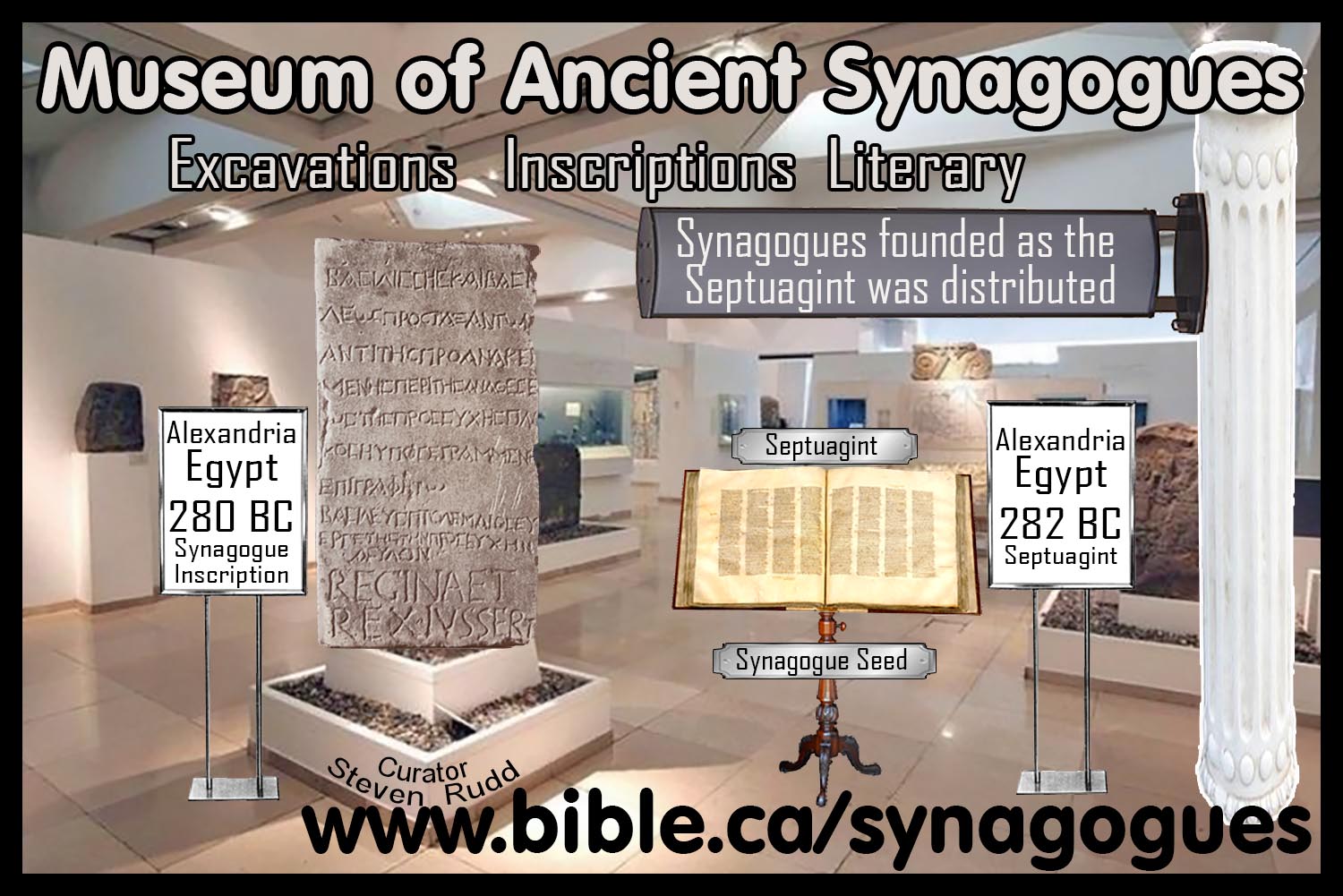
2. The first charges of corrupting and changing the word of God was Christians against the Jews:
a. The Jews living 130 -180 AD began to corrupt and change the Greek translation of “virgin” in Isa 7:14.
g. The Genesis 5 and 11 chronology was corrupted at the same time and Augustine notes that the lower chronology found in the Masoretic manuscript is both wrong and “impossible to explain”.
|
The Septuagint LXX “Scripture Cannot Be Broken” |
|||||
|
Start Here: Master Introduction and Index |
|||||
|
Six Bible Manuscripts |
|||||
|
1446 BC Sinai Text (ST) |
1050 BC Samuel’s Text (SNT) |
623 BC Samaritan (SP) |
458 BC Ezra’s Text (XIV) |
282 BC Septuagint (LXX) |
160 AD Masoretic (MT) |
|
Research Tools |
|||||
|
Steve Rudd, November 2017 AD: Contact the author for comments, input or corrections |
|||||
By Steve Rudd: November 2017: Contact the author for comments, input or corrections.
Go to: Main Bible Manuscripts Page
